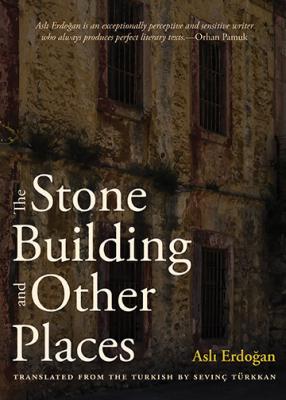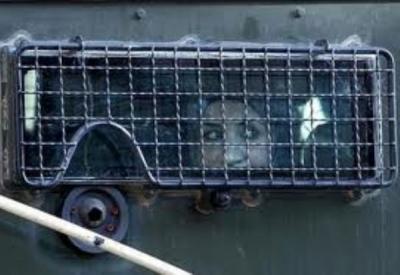On August 20, 2016, as Sevinç Türkkan worked on her English translation of The Stone Building and Other Places, its 49-year old author, Aslı Erdoğan, was arrested by the Turkish state police and charged with supporting a terrorist organization. She had been serving as an editorial advisor to a pro-Kurdish newspaper advocating for the rights of Kurds living in Turkey. After 136 days of pre-trial detention, she was released. Today she awaits trial for “destruction of the unity of the state.”
 The Stone Building now appears to have foreshadowed her imprisonment. A best-seller in Turkey, the book comprises four linked stories concerning enforced isolation, persecution, and post-trauma survival. One would think that the stories, not the presence of her name on a publication masthead, represent a much more assertive challenge to the regime of the autocrat Recep Tayyip Erdoğan, whose latest blunders have brought the Syrian war to his southern border.
The Stone Building now appears to have foreshadowed her imprisonment. A best-seller in Turkey, the book comprises four linked stories concerning enforced isolation, persecution, and post-trauma survival. One would think that the stories, not the presence of her name on a publication masthead, represent a much more assertive challenge to the regime of the autocrat Recep Tayyip Erdoğan, whose latest blunders have brought the Syrian war to his southern border.
In “The Morning Visitor,” a woman living in “a northern country” lives in a bleak wooden house with other people for uncertain reasons. There is “the Bosnian who takes particular pleasure from showing off his shrapnel wounds … a Russian who makes a living acting in porn films and likes to listen all night to protest songs from a long-gone era … the supposedly Somalian mother who’s actually a Rumanian, one hundred percent gypsy, a freeloader and a flirt who hasn’t worked a single day in her life …” Like other characters in these stories, “Resigned to a fate they despise, they trust nothing beyond their misfortune.” Visited by a stranger, the woman says, “You come to remind me that I have never left that place. That dark cell, it follows me wherever I go.”
The second piece, “Wooden Birds,” presents a group of women convalescing in a German tuberculosis sanatarium. Several have arrived from other places – Turkey, Croatia, Argentina. Given day passes, they embark on a walk through the Black Forest. There are oblique references to their pasts – political exile, prison, torture.
 In “The Prisoner,” a 32-year old pregnant woman, apparently unmarried, spends a troubled day alone in Istanbul. The narrator speaks of “the step-by-step erasure of her self as an anonymous woman,” though the cause of her excruciated dissolve is unspecified. At a small restaurant, “She was surprised to realize how spiteful she had become toward the real world – if you could call it that – which she could neither reject nor join up with.” She had planned to abort the fetus. There are hints that she or her lover had recently emerged from a prison term – “Their relationship was rooted in words crossed out by prison censors.” Her “acquired identity” is a post-incarceration residue. For Erdoğan, punishments exacted the by state are experienced in the body, as if one’s place in the world had been subverted and the body is all that’s left: “A dizzying tug of war had taken hold over her body: between what was lost and gone forever and what hadn’t yet begun, what belonged to her completely and what did not.”
In “The Prisoner,” a 32-year old pregnant woman, apparently unmarried, spends a troubled day alone in Istanbul. The narrator speaks of “the step-by-step erasure of her self as an anonymous woman,” though the cause of her excruciated dissolve is unspecified. At a small restaurant, “She was surprised to realize how spiteful she had become toward the real world – if you could call it that – which she could neither reject nor join up with.” She had planned to abort the fetus. There are hints that she or her lover had recently emerged from a prison term – “Their relationship was rooted in words crossed out by prison censors.” Her “acquired identity” is a post-incarceration residue. For Erdoğan, punishments exacted the by state are experienced in the body, as if one’s place in the world had been subverted and the body is all that’s left: “A dizzying tug of war had taken hold over her body: between what was lost and gone forever and what hadn’t yet begun, what belonged to her completely and what did not.”
 Finally, there is the eight-part novella “The Stone Building.” “Those at the coffeehouse know this hell intimately, even if they don’t give it a name,” says the narrator. This is Erdoğan’s abiding belief – that each of us has an inherent fear of looming powers that plot to control our behavior. But also, she finds something deeply embedded in our way of life that ruins us – “every human life is a defeat.” Consider that the great President Erdoğan sent 60 security personnel to arrest this writer and ransack her apartment. In “The Stone Building,” there is someone named “A” who “is in the world like a sponge thrown into dirty water.”
Finally, there is the eight-part novella “The Stone Building.” “Those at the coffeehouse know this hell intimately, even if they don’t give it a name,” says the narrator. This is Erdoğan’s abiding belief – that each of us has an inherent fear of looming powers that plot to control our behavior. But also, she finds something deeply embedded in our way of life that ruins us – “every human life is a defeat.” Consider that the great President Erdoğan sent 60 security personnel to arrest this writer and ransack her apartment. In “The Stone Building,” there is someone named “A” who “is in the world like a sponge thrown into dirty water.”
There he stood, in front of the stone building, swaying unconsciously, like an eyelid closing, opening, then closing again. Like a scar from an old burn on the earth’s skin, like a birthmark. Like a wax seal – proof of authenticity – bleeding out along the edges when pressure is applied and then hardening into its final shape, its human shape. He was amazingly calm – he had understood everything, forgiven everything … Still, it was the language of wounds that spoke in him, of wounds and desolation, of deserted marketplaces, ruthless streets, beds in a jail cell, of stories with no protagonist … A language that no one wants and no one hears, words wrested from silence, wrapped in an aura of inscrutability, and returned to silence. If it were ever heard, it might have attracted the human world like a siren’s song, luring it in, smashing it against the walls of the stone building.
This “language that no one wants” is, of course, Erdoğan’s own, and smashing is her mission, a breaking of silence. While in prison, she read poetry by Celan and Rilke, and fiction by Coetzee, Murdoch, Henry James, Proust – and Kafka. The hazily defined but unrelentingly oppressive and sinister environments of her narratives conjure those of Kafka, suggesting that her work’s locations extend beyond the specific conditions of Turkey to something more pervasive in the world, a crushing, global disenfranchisement of the individual. There is little in her writings to charm the reader, and no consolation. What one hears is voice uprooted from the comforts of unharassed life – yet committed to the actuality of its condition, unblinking. As a fictional device, plot gives way to an unending moment, a condition without conclusion.
 Born in 1967, Erdoğan received her Ph.D. in particle physics and worked for CERN in Geneva (the European Agency for Nuclear Research). In 1996, she gave up her scientific career to focus on her writing. An earlier novel, The City in Crimson Cloak, has also been translated for Anglophones. That novel is set in Rio de Janiero where she once lived.
Born in 1967, Erdoğan received her Ph.D. in particle physics and worked for CERN in Geneva (the European Agency for Nuclear Research). In 1996, she gave up her scientific career to focus on her writing. An earlier novel, The City in Crimson Cloak, has also been translated for Anglophones. That novel is set in Rio de Janiero where she once lived.
Turkey temporarily restored Erdoğan’s right to travel, and earlier this month she addressed the 10th Geneva Summit for Human Rights and Democracy where she said, “The situation gets more and more grave as the silence of the international community deepens.” Brushing aside the importance of her case, she said that while attention is given to high profile cases like hers, “there are thousands of students in jail for having written a single tweet.”
[Published by City Lights Books on February 278, 2018. 174 pages, $15.95 paperback]